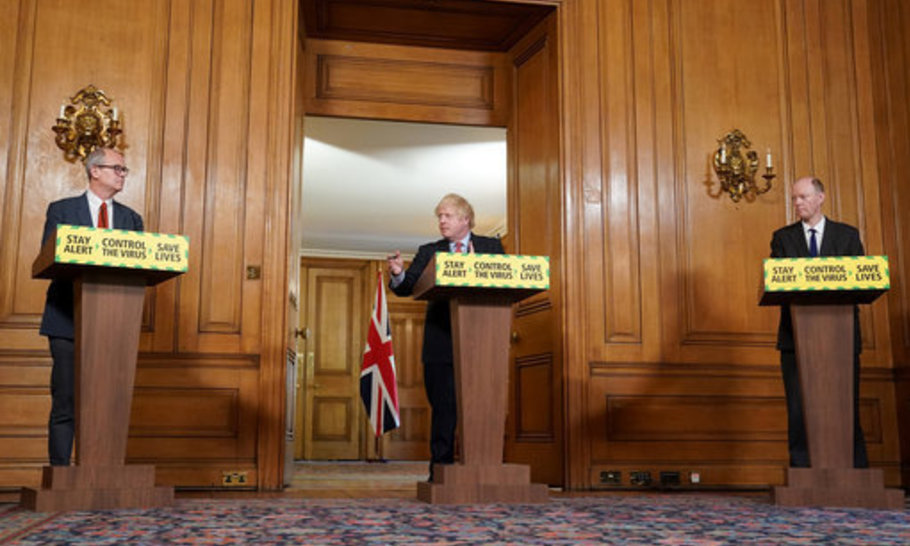Could we have the old Boris back, please? Or has the virus done for him?

Pippa Fowles/DPA/PA Images
There is much that we still don’t know about Covid-19. In particular, the long-term effects of this coronavirus on mental health, if any, are unclear. Professor Nicholas Hart, a leading doctor at St Thomas’s Hospital in London, has urged the Government to plan ahead: “Covid-19 is this generation’s polio,” he tweeted last month. “Large numbers of patients will have physical, cognitive and psychological disability post critical illness that will require long-term management.”
One of these patients is the Prime Minister. Along with Dr Nick Price, Professor Hart was one of the two doctors who treated Boris Johnson. His comment has been widely discussed, but it raises a difficult question: is the Boris Johnson now running the Government the same man who was elected less than seven months ago? Or has his near-death experience in April changed him beyond recognition into a manic meddler?
Watching him in action at the Downing Street press conference on Wednesday, it was hard not to notice how different the Prime Minister’s political attitudes now are from those of the man who swept to power in a landslide last December. Asked what he would do for those who lost their jobs as a result of the crisis, Boris Johnson waxed lyrical about how “interventionist” he would be. Every young person who was made unemployed would, he promised, be offered an apprenticeship. But the reality is that many employers do not want apprentices, even though they already pay a levy towards the cost. The cost of retraining millions of unemployed people could run into the hundreds of billions — and here was the Prime Minister making an unfunded pledge on the hoof.
A more worrying example of the PM’s judgement has been the policy on quarantine. While other countries afflicted with coronavirus slammed their doors shut months ago, Britain kept its airports open. Now that the threat of infection from abroad has diminished, the Home Office plans to quarantine all visitors for two weeks. Stable doors and bolting horses, anyone?
Deaf to protests from the aviation and tourism industries, Downing Street now faces a Tory rebellion led by the normally loyal Theresa May. As Sir Patrick Vallance, the Chief Scientific Adviser, admitted yesterday, this policy was not recommended by Sage, the Scientific Advisory Group on Emergencies. It appears to be driven mainly by Dominic Cummings, the Prime Minister’s chief of staff — and fellow Covid-sufferer.
What is it about the political psychology of coronavirus? Why does it appear to turn those who recover into hyperactive interventionists? Is it the feeling of gratitude that led Boris to give his baby son the middle name Nicholas, after the two doctors who saved his own life? Or is there some profound cognitive change that sends the mind of the sufferer into overdrive? Whatever the cause, we should beware of the effects.
However, this is still the Boris Johnson who was elected on a manifesto that promised to level up the neglected regions of the country, most of which voted for him. He has a mandate for targeted intervention. Since then, the pandemic and the lockdown have sent the economy into free fall. The recession not only justifies but necessitates intervention on a much larger scale than could possibly have been envisaged before the crisis. Rishi Sunak’s instinct is surely to let money fructify in our pockets rather than to spend it for us. Yet even he has found himself becoming the most interventionist Chancellor in history. And he hasn’t even had the virus yet.
The Prime Minister is well aware that every state intervention comes at a price which goes far beyond the cost to the Exchequer. It is not just that central planning seldom delivers what was promised — it also disrupts the spontaneous order of the market. The sooner we let those who create the wealth also invest it, the sooner we will get the economy back on track. The Government must provide what used to be called a safety net, but the metaphor now preferred by ministers is that the state should “put its arms around” us. That sounds stifling, even sinister. The public isn’t asking to be hugged by the Government. At most, a helping hand is needed.
The quarantine policy is a good example of a coronavirus overreaction. Even before it has been implemented, it is proving unpopular, unscientific and unnecessary. It also sends the wrong signal to the rest of the world.
Everyone in Downing Street needs to calm down. They don’t need a new initiative every day, let alone a dozen of them. A weekend at Chequers might clear the Prime Ministerial head. He used to appear laid-back, even lazy, but that appearance was deceptive. Johnsonism was based on Thatcherite, Gladstonian liberal, laissez-faire principles. He also used to be quite funny. Never before has the nation needed cheering up as much as it does now. We would like the old Boris back, please. Or has the virus done for him?





